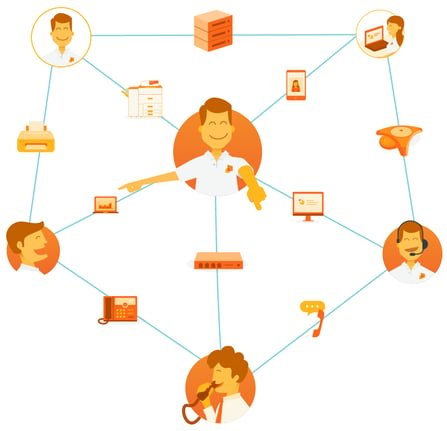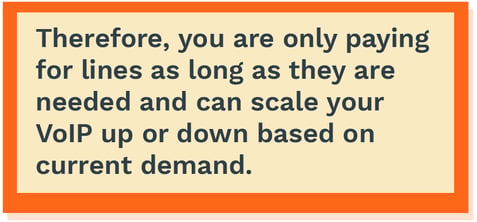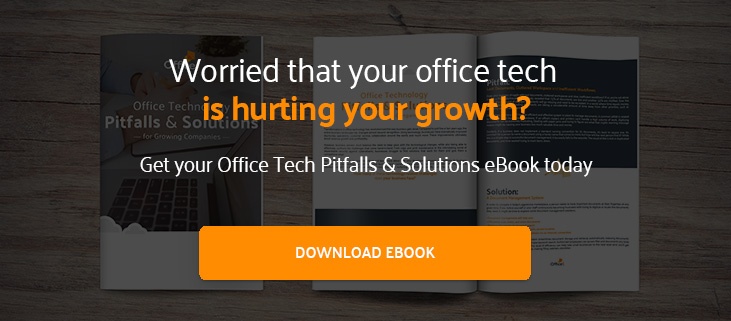
A Company’s organization relies on efficient communication among all vendors, partners, customers, and employees. Communication is directly tied to efficiency, and every minute wasted can harm profitability. Cloud-based VoIP services offer a big advantage to a company’s business. VoIP identifies inefficient workflows, corrals vendors, and achieves consistent financial performance across an entire organization. Here are the main benefits of cloud-based VoIP:
Reduce Your Costs
Flexibility is invaluable for businesses as they onboard new customers, hire employees and open new offices. Many VoIP providers offer lower per-minute fees than landline phone providers. Cloud-based VoIP allows your business to add in as many extensions as necessary to accommodate call volume. It also allows you to deactivate these lines if they are no longer needed with a simple phone call.

Examine your financials and see if switching to a cloud-based system could help reduce your costs. If you’ve been stuck with outdated landlines up until now, you’ll almost certainly save money and receive more consistent usage bills from month to month with the scalable cost offered by VoIP.
Eliminate Risk of Downtime
VoIP providers generally host services in multiple locations with redundant servers. Even if one goes down, the others will pick up the slack. Compared with on-premise telephony systems, this extra level of security means one thing: peace of mind. Cloud-based servers significantly reduce the risk of downtime and guarantee that your communications are stable and consistent.
Centralize Your Systems
If you’re tasked with managing multiple offices, you know that communication can be a nightmare. VoIP services centralize an organization’s communication system across the entire enterprise and creates a single platform for all messaging. When all offices share the same phone system, it’s much easier to keep track of records, customer call logs, and vendor touch points (i.e. payment history). With this information at your fingertips, you can rest assured that the stressful financial decisions you’re making are backed by justifiable data.
Enjoy Mobile Communications
VoIP services can be accessed from anywhere with a stable internet connection, making them the ideal option for organizations with large number of remote workers or employees who travel from office to office. Consider how many channels your organization has: email, text messages, phone calls, video conferences, and more. Collecting and managing this data across every platform is time-consuming, and fortunately, completely unnecessary in a VoIP environment. VoIP services guarantee efficiency no matter where employees are.

Reduce IT Management
VoIP systems take the telephony infrastructure out of your hands and puts it in the control of a service provider. On the client side, this means you’re freed of the burden of troubleshooting these in-house systems. Should glitches occur, you can simply contact your VoIP service provider and get a solution sorted out rather than spending hours coordinating details with your own technicians.
In other words, outsourcing this service gives valuable time and resources back to your company. From cutting costs to reducing your assets under management, outsourced phone services will help you get your house in order. Whether you’re tired of having to micromanage issues with your outdated phone system or you’re sick of spending money on services you don’t need, outsourcing cloud-based VoIP services can help lower you and your team’s IT stress.
Better Customer Service
With the Auto Attendant or Virtual Receptionist (VR) feature, your business can effortlessly direct calls to different departments or customize greetings per given department. The setting allows you to record on-hold messages about special promotions and deals, and also allows you to pre-set certain greetings to end at a specific time or date. Customer experience is heightened as a direct result from these features! For example, your business could record a seasonal greeting and pre-set it to go back to the original recording on a specific date. These settings improve customer service by allowing you to better connect with your customers.
Integrates With Other Business Systems
Cloud-based VoIP systems are easily integrated with other business applications because it is internet based. For example, you can send calls through email applications such as outlook, and access your voicemail through email. Additionally, this feature transcribes voicemails into text and sends them to your email account. With these systems being so closely integrated, your company will never miss a beat over communication errors commonly brought on through technology. VoIP optimizes communication workflows and allows you to efficiently and clearly communicate with your colleagues, clients and vendors.
With nearly 206 billion emails being sent out every day, optimizing the way your business communicates can greatly increase productivity and reduce confusion throughout your office. Assess what the pain points are in your company-wide communication to ensure you aren’t missing any opportunities when it comes to your communication system!











